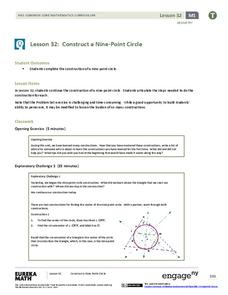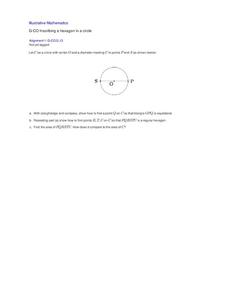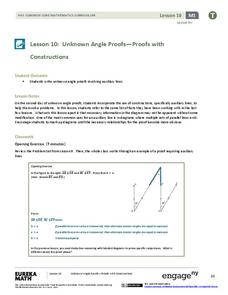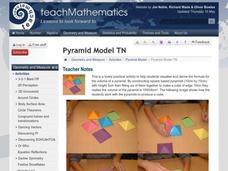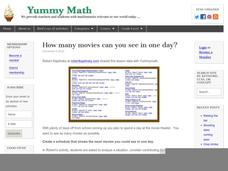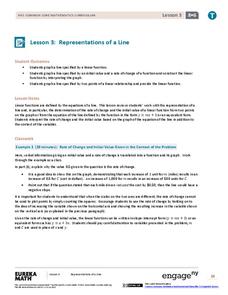EngageNY
Congruence, Proof, and Constructions
This amazingly extensive unit covers a wealth of geometric ground, ranging from constructions to angle properties, triangle theorems, rigid transformations, and fundamentals of formal proofs. Each of the almost-forty lessons...
EngageNY
Construct a Square and a Nine-Point Circle
Anyone can draw a square, but can you CONSTRUCT a square? Here is a resource that challenges math scholars to create steps to finish their own construction. They test their ability to read and follow directions to complete a construction...
EngageNY
Construct an Equilateral Triangle (part 1)
Drawing circles isn't the only thing compasses are good for. In this first installment of a 36-part series, high schoolers learn how to draw equilateral triangles by investigating real-world situations, such as finding the location of a...
EngageNY
Rectangles Inscribed in Circles
Putting a rectangular object into a circular one—didn't the astronauts on Apollo 13 have to do something like this? Learners first construct the center of a circle using perpendiculars. They then discover how to inscribe a rectangle in a...
EngageNY
Construct an Equilateral Triangle (part 2)
Triangles, triangles, and more triangles! In this second installment of a 36-part series, your young mathematicians explore two increasingly challenging constructions, requiring them to develop a way to construct three triangles that...
EngageNY
Construct a Nine-Point Circle
There are an infinite number of points on a circle; can you find nine of them? After putting together a nine-point circle, pupils use constructions and their knowledge of triangle segments to determine the center of the circle. Learners...
EngageNY
Construct and Apply a Sequence of Rigid Motions
Breaking the rules is one thing, proving it is another! Learners expand on their previous understanding of congruence and apply a mathematical definition to transformations. They perform and identify a sequence of transformations and use...
EngageNY
Special Lines in Triangles (part 1)
Allow your pupils to become the mathematicians! Individuals explore the properties of a midsegment of a triangle through construction and measurement. Once they figure out the properties, learners use them to draw conclusions.
Curated OER
Inscribing a Hexagon in a Circle
This activity is a follow-on activity to inscribing a square in a circle. The overall problem is more complex. It deals with geometric constructions, properties of triangles, and regular hexagons. The final part of the activity...
EngageNY
Unknown Angle Proofs—Proofs with Constructions
Provide your emerging mathematicians with the tools to learn as they incorporate auxiliary lines to solve unknown angle proofs in this continuing segment. They decipher information from a diagram to uncover the missing pieces and...
EngageNY
Sampling Variability in the Sample Proportion (part 2)
Increase your sample and increase your accuracy! Scholars complete an activity that compares sample size to variability in results. Learners realize that the greater the sample size, the smaller the range in the distribution of sample...
EngageNY
Coordinates of Points in Space
Combine vectors and matrices to describe transformations in space. Class members create visual representations of the addition of ordered pairs to discover the resulting parallelogram. They also examine the graphical representation...
Curated OER
Mathematics In You
Young scholars construct ratios using the hand as data. They use examples of cortical and trabecular bone found in the long bones to measure circumference, diameter, length, and weight of long bones. They perform computations using...
EngageNY
Characterize Points on a Perpendicular Bisector
Learn transformations through constructions! Pupils use perpendicular bisectors to understand the movement of a reflection and rotation. They discover that the perpendicular bisector(s) determine the line of reflection and the...
EngageNY
Looking More Carefully at Parallel Lines
Can you prove it? Making assumptions in geometry is commonplace. This resource requires mathematicians to prove the parallel line postulate through constructions. Learners construct parallel lines with a 180-degree rotation and then...
Jim Noble, Richard Wade & Oliver Bowles
Pyramid Model
Seeking to derive the formula for the volume of a square pyramid, geometry learners construct six square based pyramids that, when pieced together properly, form a cube. Two short videos demonstrate the relationship...
Curated OER
Living in a Geometrical World
Students participate in a series of hand-on, online, and multimedia activities to examine 2 dimensional and 3 dimensional shapes. They describe common geometric solids. They construct rectangular prisms using straws and ribbon.
Curated OER
Discovering Conic Sections in the Motion of Heavenly Bodies
Math scholars study conics and how they are used today. For this mathematical lesson, pupils construct and slice cones after viewing a demonstration.
Curated OER
How many movies can you see in one day?
For kids who love movies, figuring out a schedule for the maximum number that can be seen in one day is not only a good demonstration of Common Core mathematical practices, but also a highly motivating activity. Robert Kaplinsky...
EngageNY
Representations of a Line
Explore how to graph lines from different pieces of information. Scholars learn to graph linear functions when given an equation, given two points that satisfy the function, and when given the initial value and rate of change. They solve...
Illustrative Mathematics
Temperatures in degrees Fahrenheit and Celsius
Learners investigate the relationship between the Fahrenheit and Celsius temperature scales. Given two data points, they construct a linear function to describe the relationship, find the inverse of the function, and make observations...
Curated OER
Mapping Your State's Role in the Vietnam War
Students recognize reasons to celebrate Memorial Day. Students create a map of victims of the VIetnam War. Using the internet, students research information about soldiers from their state who were killd in action in Vietnam. Students...
CK-12 Foundation
Using Quadratic Equations to Solve Problems: Construct a Soccer Field
Build a soccer field through a little mathematical analysis. Individuals manipulate the dimensions of a soccer field as they drag points to new positions. The simulation shows the corresponding intercepts and area. As pupils explore the...
Illustrative Mathematics
Points equidistant from two points in the plane
Young geometers apply their deductive reasoning skills and knowledge of proving triangles congruent in a task that asks them to prove if a point lies on the perpendicular bisector of a segment, then it is equidistant from the endpoints...





